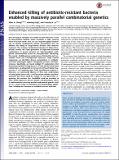Enhanced killing of antibiotic-resistant bacteria enabled by massively parallel combinatorial genetics
Author(s)
Cheng, Allen A.; Ding, Huiming; Lu, Timothy K.
DownloadCheng-2014-Enhanced killing of.pdf (1.083Mb)
PUBLISHER_POLICY
Publisher Policy
Article is made available in accordance with the publisher's policy and may be subject to US copyright law. Please refer to the publisher's site for terms of use.
Terms of use
Metadata
Show full item recordAbstract
New therapeutic strategies are needed to treat infections caused by drug-resistant bacteria, which constitute a major growing threat to human health. Here, we use a high-throughput technology to identify combinatorial genetic perturbations that can enhance the killing of drug-resistant bacteria with antibiotic treatment. This strategy, Combinatorial Genetics En Masse (CombiGEM), enables the rapid generation of high-order barcoded combinations of genetic elements for high-throughput multiplexed characterization based on next-generation sequencing. We created ~34,000 pairwise combinations of Escherichia coli transcription factor (TF) overexpression constructs. Using Illumina sequencing, we identified diverse perturbations in antibiotic-resistance phenotypes against carbapenem-resistant Enterobacteriaceae. Specifically, we found multiple TF combinations that potentiated antibiotic killing by up to 10[superscript 6]-fold and delivered these combinations via phagemids to increase the killing of highly drug-resistant E. coli harboring New Delhi metallo-beta-lactamase-1. Moreover, we constructed libraries of three-wise combinations of transcription factors with >4 million unique members and demonstrated that these could be tracked via next-generation sequencing. We envision that CombiGEM could be extended to other model organisms, disease models, and phenotypes, where it could accelerate massively parallel combinatorial genetics studies for a broad range of biomedical and biotechnology applications, including the treatment of antibiotic-resistant infections.
Date issued
2014-08Department
Harvard University--MIT Division of Health Sciences and Technology; Massachusetts Institute of Technology. Department of Biological Engineering; Massachusetts Institute of Technology. Department of Electrical Engineering and Computer Science; Massachusetts Institute of Technology. Research Laboratory of Electronics; Massachusetts Institute of Technology. Synthetic Biology CenterJournal
Proceedings of the National Academy of Sciences of the United States of America
Publisher
National Academy of Sciences (U.S.)
Citation
Cheng, A. A., H. Ding, and T. K. Lu. “Enhanced Killing of Antibiotic-Resistant Bacteria Enabled by Massively Parallel Combinatorial Genetics.” Proceedings of the National Academy of Sciences 111, no. 34 (August 11, 2014): 12462–12467.
Version: Final published version
ISSN
0027-8424
1091-6490